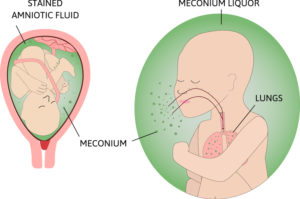Meconium aspiration syndrome definition
 Meconium, which is the first feces of the newborn, is typically passed on the first day following birth. However, this may happen while the baby is in the womb (in utero) when thick meconium can still get into the amniotic fluid.
Meconium, which is the first feces of the newborn, is typically passed on the first day following birth. However, this may happen while the baby is in the womb (in utero) when thick meconium can still get into the amniotic fluid.
Sometimes, if a fetus experiences stress while in utero — like infection or lack of oxygen — it can cause them to take forceful gasps and inhale the meconium and amniotic fluid. Infants who are post-dates, over 40 weeks gestation, have a higher likelihood of passing meconium while in utero.
The infant can inhale (aspirate) the meconium fluid before, during, or after birth. The mixture can then travel to their lungs and cause meconium aspiration syndrome.
Meconium aspiration syndrome occurs in about 5-10% of births. Even though the presence of meconium does not always lead to complications, it can cause harm to a baby if it isn’t cleared right away and moves into the airways.
Babies who suffer a birth injury related to MAS may experience long-term health issues like asthma, chronic lung disease, and cerebral palsy. Treating these conditions can be expensive, but our team may be able to help you pursue compensation for these costs.
If you think your child suffered from complications related to MAS, connect with one of our trusted nurse advocates today to see what might have caused it.
What causes meconium aspiration syndrome?
Several factors can cause a baby to release and inhale meconium before they’re born.
Meconium aspiration is more likely to happen in pregnancies when the:
- Delivery is difficult or prolonged
- Doctor fails to suction the baby’s airways (mouth, nose, and throat)
- Infant is past their due date
- Mother has high blood pressure (preeclampsia)
- Placenta is infected
- Umbilical cord is wrapped around the baby’s neck
Pediatric doctors are responsible for suctioning the baby’s airways quickly so the baby doesn’t experience hypoxia (lack of oxygen in the tissues) or hypoxemia (lack of oxygen in the blood).
Medical staff will know if there is meconium in the amniotic fluid if, at the time of the rupture of membranes (water breaking), the fluid has a dark brown-greenish color to it instead of being clear.
If the doctor fails to suction the baby’s airways in a timely manner after birth, and it leads to MAS, they may have committed medical malpractice.
Call us today at (855) 220-1101 to see if you can take legal action for your child’s MAS.
Meconium aspiration syndrome symptoms
One early symptom of meconium aspiration syndrome is a green or yellow tint to the mother’s water after it breaks, showing that there is already thick meconium in the amniotic fluid at the beginning of labor.
Other symptoms of meconium aspiration syndrome may include:
- Bluish tint to the skin (cyanosis)
- Difficulty breathing or lack of independent breathing
- Enlarged or bloated chest
- Grunting sounds when exhaling
- Limpness
- Retractions (increased use of respiratory muscles)
- Slow heart rate
- Suctioning out dark green fluid from the infant’s mouth (meconium-stained fluid)
Sometimes symptoms don’t appear right away, so health care professionals should continue to check on the mother and baby after birth.
If you believe your baby suffered from meconium aspiration syndrome due to a medical professional’s negligence, contact us today. We can connect you to a birth injury lawyer who may be able to help you pursue compensation for the emotional and financial suffering you’ve experienced.
Meconium aspiration syndrome treatment
The sooner meconium aspiration is treated, the better the chance that the baby can make a full recovery. If a doctor takes too long to begin treatment, the baby may experience complications that could have been avoided.


For example, the baby may need to spend time in the newborn intensive care unit (NICU) or a special care nursery after delivery.
Doctors typically treat MAS using one of these methods:
- Antibiotics to prevent pneumonia or other infections
- Extracorporeal membrane oxygenation (ECMO) to pump blood from the baby’s body to an artificial lung
- Inhaled nitric oxide to open blood vessels and help restore oxygen to the affected tissues
- Intravenous (IV) fluids
- Mechanical ventilation (breathing machine) to keep the baby’s lungs inflated
- Surfactant replacement therapy to open up the baby’s lungs
- Tapping on the baby’s back to loosen mucus in the lungs and move it out of the airways
- Using a warmer to maintain the baby’s body temperature
Many of these treatments, such as nitric oxide and surfactant replacement therapy, are used together to get the best results.
Treatments for meconium aspiration depend on the amount and thickness of the meconium, how long your baby was exposed to it, and the severity of their breathing problems.
Do babies recover from meconium aspiration?
In most cases, yes. Some babies with meconium aspiration syndrome only experience minor breathing issues that clear up in 2-4 days.
Unfortunately, babies who don’t recover from meconium aspiration can be left with long-term or even permanent health conditions.
A severe incidence of MAS can lead to chronic coughing and wheezing for up to 10 years, which may require the use of a breathing machine. Sometimes the child experiences permanent lung damage.
If the hypoxia caused by meconium aspiration syndrome is bad enough, the infant may suffer brain damage and develop permanent conditions like cerebral palsy.
Get help for meconium aspiration syndrome caused by medical negligence
Although the presence of meconium is usually not a problem on its own, pediatric doctors should understand the potential for issues to arise if it is inhaled into the lungs. Even after clearing the baby’s airways, medical professionals are responsible for monitoring the infant to recognize signs of fetal distress that could turn into serious complications.
If the doctor doesn’t recognize the signs of meconium aspiration and fails to take action in time, the baby could be harmed as a result of their medical negligence. This may lead to long-term health conditions, permanent brain damage, or even death.
If your baby developed meconium aspiration syndrome because of negligent medical care, you may be able to sue the doctor and/or hospital. Contact us for a free case review and learn about your next steps.




